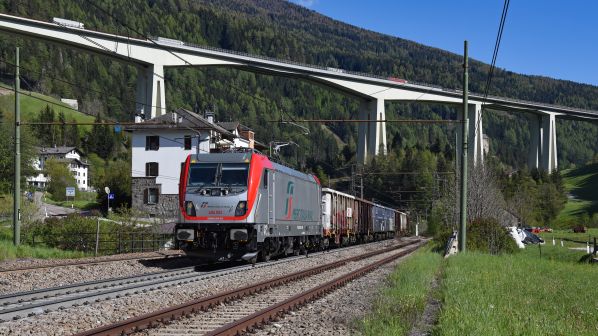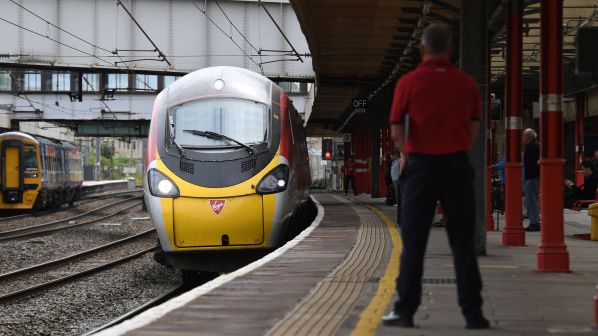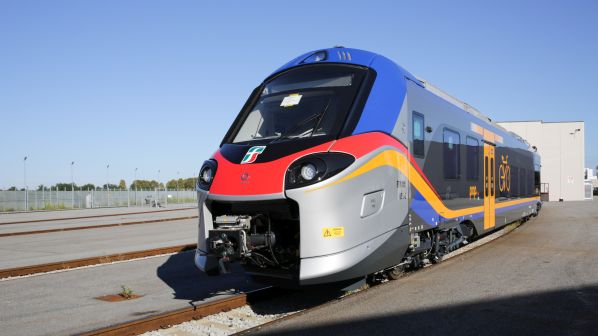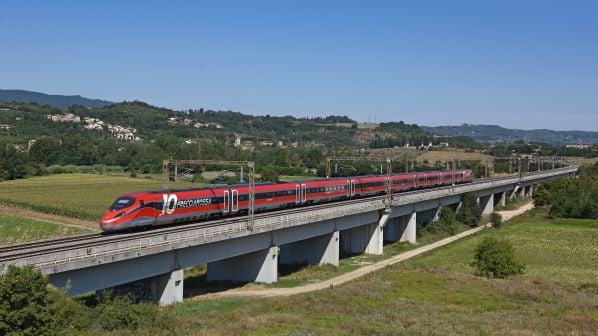ITALIAN State Railways (FS) has proved adept at coping with Italy’s roller-coaster political scene even when faced with politically-driven changes to its senior management team, as happened last year.
A month after taking office in June 2018, Italy’s transport minister, Mr Danilo Toninelli, decided to remove the entire FS board including CEO, Mr Renato Mazzoncini, and appoint a new board chaired by Mr Gianluigi Vittorio Catelli, with Mr Gianfranco Battisti named CEO. Battisti is a career railwayman having been with FS for 20 years. His most recent positions were director of Trenitalia’s high-speed division followed by CEO of FS Urban Systems.
Following the collapse of the 15-month coalition between the anti-establishment Five Star Movement (M5S) and the League party at the beginning of September and the formation of a new coalition between M5S and its former adversary the centre-left Democratic Party, Toninelli was replaced by Ms Paola De Micheli, who appears to be more pro-rail than her predecessor. De Micheli says she is in favour of the Turin - Lyon high-speed project, which M5S bitterly opposes. The question now is how long the new coalition will survive in view of the previous animosity between M5S and the Democratic Party.
Despite the management change, FS is pushing ahead with its 2019-2023 plan which it published in May.
There are also moves afoot to hive off FS’ infrastructure manager subsidiary, Italian Rail Network (RFI), early next year as a separate state-owned entity. Up to now, Italy, in common with France and Germany, has resisted pressure from the European Union to separate the management of infrastructure from operating trains. Such a move would make it easier to privatise FS, something which previous Italian governments have rejected.
In the meantime and despite the management change, FS is pushing ahead with its 2019-2023 plan which it published in May. This calls for an investment of €58bn, the bulk of which is for infrastructure. The plan will see spending peaks of up to €13bn per year, which is 75% more than the €7.5bn invested in 2018. FS will fund 24% of the spending from its own resources.
FS says this record commitment makes it the leading investor in Italy. The plan will boost growth in Italy by creating 120,000 jobs a year, with 15,000 direct hires over five years and an annual contribution to increasing GDP of between 0.7% and 0.9%.

with new Bombardier E494 Traxx locomotives.
Photo: Marco Stellini
Annual turnover is forecast to soar by 40% from the €12bn achieved in 2018 to reach €16.9bn by 2023, while Ebitda will rise from €2.48bn to €3.3bn over the same period and net profit is expected to increase from €559m last year to €800m by 2023.
In July, Italy’s Inter-ministerial Committee for Economic Programme (Cipe) approved €28bn in additional funding for infrastructure investment. FS says the announcement gives it the green light to update the programme contracts between the Ministry of Infrastructure and Transport and FS’ two infrastructure subsidiaries: RFI and highways organisation Anas.
As a result, RFI’s 2018-19 update of its 2017-2021 investment programme has been approved with an additional €15.4bn for investment in the 24,500 track-km rail network, while Anas has been allocated an extra €12.5bn for the 30,000km highway network it manages.
FS says the approval of this additional spending assures its 2019-2023 plan to invest €28bn in the rail network and €14bn in roads.
Five-year programme
The rest of the five-year programme will see €12bn allocated for the purchase of new trains and buses, 88% of which will be funded by FS, and €2bn for urban rail projects, with 60% self-funded, while FS will entirely fund a €2bn investment in information technology services and the property sector, and more than €6bn in technology and digitisation across all sectors.
FS says its investment strategy will switch the focus from expanding high-speed services and integrating different modes of transport during the last decade to concentrating on the needs of customers by providing higher quality services. “Our goal is to transform collective mobility in Italy, significantly improving the level of service to people, with a strong leap in the quality and customisation of the offer,” FS explains.
FS estimates that it will carry 90 million more passengers which should reduce annual CO₂ emissions by 600 million kg and result in 400,000 fewer cars on the roads as more people switch to rail travel.
FS expects the extra infrastructure spending to have a considerable impact on the progress of some of its major railway projects. These include:
- the Italian portion of the Brenner Base Tunnel project linking Innsbruck with northern Italy
- the €6.2bn Terzo Valico project to construct a new 53km line (of which 37km is in tunnel) from Genoa north to Tortona to increase capacity and accelerate services between Genoa and Milan and Turin
- the final Brescia - Verona - Padua section of the Milan - Verona - Venice high-speed line
- the Naples - Bari high-speed line, and
- a new line connecting the three largest cities on the island of Sicily: Palermo, Catania and Messina.
FS says more than 2000 new passenger coaches, locomotives, freight wagons and buses will be purchased which will make its fleet the youngest in Europe, with the average age of the regional passenger fleet falling from 21 years in 2018 to 10 years by 2023. As the urban population is forecast to grow considerably, a substantial proportion of the new vehicles will be dedicated to local transport, with the acquisition of 594 new commuter and regional trains, including 216 single-deck Alstom Pop EMUs and 250 double-deck Hitachi Rock EMUs, worth €6bn. Trenitalia launched a tender on July 31 for up to 250 EMUs. The delivery of 239 new trains has also been brought forward from 2025 to 2023.
Suburban and regional rail services will be reshaped. There will be five categories of service, with frequencies tailored accordingly. These comprise:
- urban rail services on routes up to 10km long operating at eight-minute intervals during peak hours and using high-capacity metro-style trains with plenty of standing room
- suburban services on routes up to 30km running every 30 minutes
- stopping regional services with an hourly frequency for journeys up to 60km
- limited-stop inter-regional services using trains offering light refreshments running every half hour on trips of more than 60km, and
- airport rail links covering a distance of up to 40km and operating at 15-minute intervals using purpose-built trains with plenty of space for baggage and providing flight information for passengers.
The 2019-2023 investment plan also envisages a new role for FS in cities. To this end, FS will invest a total of €5.3bn, with €1.9bn allocated to upgrading intermodal hubs, €1.8bn for smart city and smart station projects, and €1.6bn for improving urban transport. In addition, €1.9bn will be spent on redeveloping urban spaces.
The expansion of ERTMS, which is already installed on its high-speed and high-capacity lines, will be crucial.
A key objective of the 2019-2023 plan is to increase the punctuality of regional services by 5% and long-distance service by 10% by investing €5.5bn to improve infrastructure and rolling stock maintenance with greater use of fault diagnostics systems.
FS says the expansion of ERTMS, which is already installed on its high-speed and high-capacity lines, will be crucial. ERTMS will be progressively extended to the conventional network to increase track capacity and reduce congestion.
Investments in new technologies will also focus on robotics and drones, the Internet of Things (IoT), Artificial Intelligence (AI), and blockchain. Three new centres of excellence have been created: FS Technology, FS International and FS Security.
Security and customer care will be enhanced by hiring 800 extra employees to provide support to passengers throughout their entire journey. Staff will be on hand at main stations, both in the concourse and on the platform, with support provided remotely at smaller stations. On-board passenger assistance will also be enhanced. In addition, FS will provide free multilingual call centres, chatbots for information and assistance, real-time information via apps and social media, and a simplified refund system using a one-click approach.
FS plans to acquire 14 additional Frecciarossa 1000 trains to expand high-speed connections in Italy. In December 2018, Trenitalia started to operate six high-speed trains per day to connect Rome Fiumicino Airport with other Italian cities. By 2023, Milan Malpensa Airport will also have direct high-speed services to Verona, Padua, Venice, Bologna and Rome.
Connections with regional airports including Bologna, Catania, Genoa, and Venice will start to be improved from 2020 onwards as well as rail links to ports such as Civitavecchia and Genoa.
FS expects to attract 20 million more foreign tourists to rail, thanks to the provision of dedicated services, improved integrated mobility, better multi-channel distribution of tickets and a customised customer experience. The objective is to increase accessibility to popular tourist destinations.
There will also be a substantial investment in upgrading of the fleet of rail freight subsidiary Mercitalia Rail with 714 new wagons and 100 new-generation locomotives to help increase rail’s modal share of freight transport. “For the first time in Europe, investment in developing freight transport will benefit from the issue of green bonds,” FS observes.
FS sees great potential to sell its expertise abroad and expects revenues from this to increase to €2.3bn by 2023. “Developing knowledge in managing infrastructure and transport projects in non-European markets will involve offering development, management and maintenance services for both high-speed and conventional rail lines, integrated urban mobility systems, infrastructure, freight and logistics, specialist consultancy and staff training,” FS says. “This will be achieved through a new company dedicated to non-EU activities and a competence centre for activities in Europe.”
FS has been steadily expanding its portfolio. It acquired Dutch bus operator Qbuzz, Busitalia Simet, British train operator C2C, and Greek train operator TrainOSE in 2017, followed by Anas in January 2018.
Bidding
FS is currently bidding for train operation contracts in Washington DC and Los Angeles, its first foray into the US market. FS is one of the partners in the consortium which will operate lines 3, 4, 5 and 6 of the new Riyadh metro. According to Italian press reports, FS has won a tender to build an intermodal terminal in Johannesburg.
Closer to home, FS train operating subsidiary Trenitalia together with Britain’s First Group won the West Coast Partnership franchise in August to operate inter-city services on Britain’s West Coast Main Line initially. The deal includes the operation of high-speed services on HS2. However, the British government announced in September that the opening of the first phase from London to Birmingham will be delayed from 2026 to 2028-2031, which will affect the terms of the contract.

Photo: Paul Bigland
Trenitalia’s ambition to operate some of its multi-system Frecciarossa 1000 trains outside Italy came a step closer to reality in the summer when two trains were sent to France for certification to operate on both the conventional network and high-speed lines. Thello, an FS subsidiary which already operates day trains between Milan and Nice and an overnight service between Milan and Paris, wants to launch a Milan - Paris high-speed service next summer in direct competition with the TGV service run by French National Railways (SNCF). A journey time of around six hours is envisaged, around one hour quicker than the current service.
In November 2018, government-appointed commissioners of Italy’s national airline Alitalia accepted an offer from FS to acquire Alitalia, which has been in special administration since May 2017 following several unsuccessful attempts to restructure the failing business. Battisti confirmed in early September that talks are still continuing. “We are working with all the other partners on what is the construction of a challenging and very competitive business plan that I believe can put the new Alitalia in a position to compete at the global level,” he said at The European House - Ambrosetti Forum in Cernobbio last month. A binding offer was supposed to be submitted by September 15. However, due to the change of government, FS was waiting to have a meeting with ministers as IRJ went to press.
FS sees its acquisition of Alitalia as another step along the road to becoming a multi-modal transport company embracing car sharing, urban transport, rail and air to be able to offer customers a complete door-to-door service. If the deal goes through, this will be the first time that a major railway has owned an airline since Canadian Pacific Railway sold CP Air in 1986. The real challenge, however, will be whether FS has the ability to revive Alitalia, which operates in a highly-competitive market, when it has no experience of running an airline.
FS calls for regional rail funding solution
A report produced for Italian State Railways (FS) by The European House Ambosetti and presented at the annual forum in Cennobbio in September calls for a new funding model and other measures to revitalise local and regional rail services in Italy.
Around 800 million passengers travel on local and regional trains in Italy annually accounting for 90% of total rail passenger traffic, but low fares and dwindling government funding mean that trains and infrastructure are old and poorly maintained, resulting in very poor service quality.
Fares have been held down by successive governments, while government support to the regions has been reduced by 21% from€6bn in 2010 to €4.8bn this year. As a result only 9.1 euro cents/passenger-km was provided to fund local services in Italy in 2018, compared with 11.3 euro cents in Switzerland and 13.1 euro cents in Germany. The amount the regions pay FS to provide the services is not distributed equally, and only three out of 21 regions allocated an additional 1% of their regional budget to compensate for the reduction in state funding.

Trenitalia has reached agreements with regions regarding the provision of local services, resulting in some investment in new trains, which will be accelerated under the 2019-2023 investment plan.
The study recommends an increase in state funding to introduce some stability in the medium to long term alongside reforms to the fares system so that different types of fares can be introduced together with multi-modal tickets. Some progress has been made with the launch of multi-modal smart cards in Veneto, Tuscany, and Umbria.
Other recommendations include adopting so-called urban plans for sustainable mobility (Pums), measures to encourage a shift from private cars to trains, turning stations into social and intermodal hubs, and making rail more attractive to tourists.

